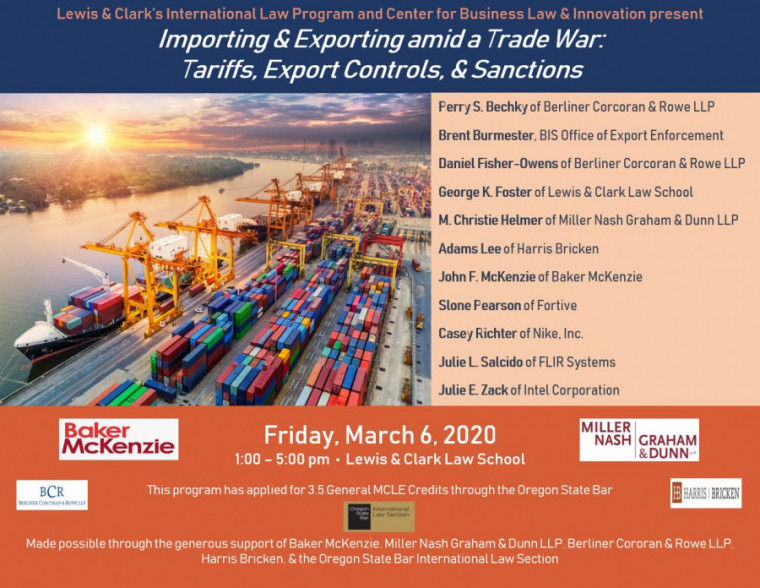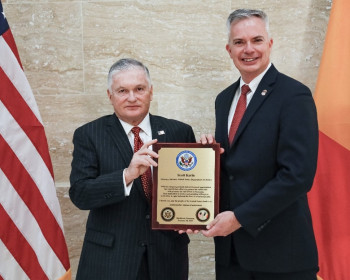CBLI and the International Law Program Host Import and Export Symposium March 6
Open gallery

Lewis & Clark’s Center for Business Law and Innovation and the International Law Program are holding a half-day symposium titled Importing and Exporting Amid a Trade War: Tariffs, Export Control, and Sanctions. The event will be held at the Lewis and Clark Campus on March 6, 2020 from 1 p.m. to 5 p.m., with a reception following.
Leading practitioners from around the country will explore issues of pressing concern to any company involved in international trade, as well as to their lawyers. Topics to be covered include tariff increases by the Trump Administration, strategies for mitigating the effects of those tariffs, and recent or anticipated changes to export controls and sanctions regimes. The event will also feature roundtable discussions on these issues with in-house trade compliance representatives from prominent companies, plus a presentation on enforcement trends by a representative from the Bureau of Industry and Security’s Office of Export Enforcement.
The first presentation will be moderated by Professor George Foster from Lewis & Clark Law School. The panelists include:
Adams Lee of Harris Bricken (Seattle), who will provide an overview of the various tariffs that President Trump has imposed so far under Section 301, Section 232, as well as anti-dumping and countervailing duties. He will also talk about duty mitigation strategies, including third-country assembly and product exclusions
John F. McKenzie of Baker McKenzie (San Francisco) will present on the other Section 301 duty mitigation strategies, including revisiting product classifications, customs duty preference for merchandise assembled abroad from U.S. origin fabricated components, duty drawback on products imported but then subsequently exported, and valuation on the basis of first sale for export.
In-house Roundtable, Part I: In-house perspectives on tariffs and mitigation strategies. Featuring Slone Pearson, VP and Assistant General Counsel, Global Trade at Fortive; Casey Richter, Assistant General Counsel, Customs and International Trade at Nike, Inc.; and Julie E. Zack, Trade Legal Counsel, Intel Corporation.
The second panel will be moderated by M. Christie Helmer of Miller, Nash, Graham & Dunn. The presenters include:
Daniel Fisher-Owens of Berliner Corcoran & Rowe LLP (San Francisco) who will provide an introduction to export controls and an overview of anticipated new restrictions on emerging technologies. He will also discuss the impact of the designation of Huawei and other Chinese companies on the Entity List.
Perry S. Bechky of Berliner Corcoran & Rowe LLP (Washington, D.C.) will discuss the introduction to sanctions regimes and an examination of recent and anticipated developments, including changes directed at Cuba, Iran, Russia and Venezuela.
Brent Burmester, Resident Agent in Charge of the Portland office of the Bureau of Industry & Security, Office of Export Enforcement, U.S. Department of Commerce will provide a governmental enforcement perspective.
Following the second panel, the in-house group returns to share insights focused on export controls and sanctions regime compliance. For this session, the group will be joined by Julie L. Salcido, Senior Manager, Global Trade Compliance Investigations and Audits at FLIR Systems and former Special Agent in Charge at the Bureau of Industry and Security’s San Jose Field Office
A reception will follow the event and be held in the Wood Hall Foyer from 5 p.m. to 6 p.m. Students and general admission please register here.
The event has applied for 3.5 CLE credits from the Oregon State Bar. For CLE credits, please register here.
The event is made possible through the generous support of Baker McKenzie, Miller Nash Graham & Dunn LLP, Berliner Cororan & Rowe LLP, Harris Bricken, and the Oregon State Bar International Law Section.

